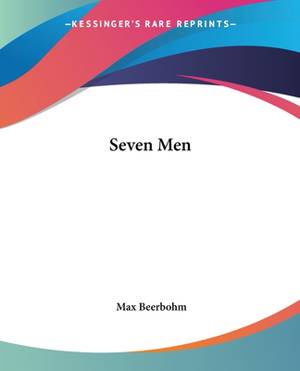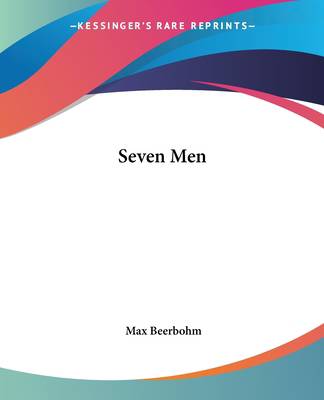
- Afhalen na 1 uur in een winkel met voorraad
- Gratis thuislevering in België vanaf € 30
- Ruim aanbod met 7 miljoen producten
- Afhalen na 1 uur in een winkel met voorraad
- Gratis thuislevering in België vanaf € 30
- Ruim aanbod met 7 miljoen producten
Zoeken
Omschrijving
Seven Men is a collection of seven essays written by the renowned English essayist and caricaturist, Max Beerbohm. The book was first published in 1919 and has since become a classic of English literature. The essays in this collection are each a character sketch of a different man, ranging from famous literary figures to obscure acquaintances of the author. The first essay is a portrait of George Bernard Shaw, the famous playwright and critic. Beerbohm's essay is a witty and satirical take on Shaw's personality and writing style. The second essay is a sketch of the author's father, a wealthy businessman who was known for his eccentricities. The third essay is a tribute to the English poet and playwright, William Butler Yeats. Beerbohm's essay is a thoughtful and insightful analysis of Yeats' poetry and his place in the literary world. The fourth essay is a portrait of the author's friend, the artist Aubrey Beardsley, who died young but left a lasting impact on the art world. The fifth essay is a sketch of the author's old schoolmaster, a man who was known for his strict discipline and his love of Latin. The sixth essay is a portrait of the author's friend, the writer and critic Walter Pater. Beerbohm's essay is a thoughtful and nuanced exploration of Pater's philosophy and writing style. The final essay in the collection is a portrait of the author himself, written in the third person. In this essay, Beerbohm reflects on his own life and career as a writer and caricaturist. Overall, Seven Men is a fascinating collection of essays that offers a unique glimpse into the personalities and lives of some of the most interesting men of the early 20th century. Beerbohm's writing is witty, insightful, and often humorous, making this book a joy to read for anyone interested in English literature and culture.`What I had done was not merely base: it was very dangerous. I was in terror that she might rally him on his devotion to London. I didn't dare to move away. I was immensely relieved when at length she said she must be going.This scarce antiquarian book is a facsimile reprint of the old original and may contain some imperfections such as library marks and notations. Because we believe this work is culturally important, we have made it available as part of our commitment for protecting, preserving, and promoting the world's literature in affordable, high quality, modern editions, that are true to their original work.
Specificaties
Betrokkenen
- Auteur(s):
- Uitgeverij:
Inhoud
- Aantal bladzijden:
- 100
- Taal:
- Engels
Eigenschappen
- Productcode (EAN):
- 9781419146817
- Verschijningsdatum:
- 17/06/2004
- Uitvoering:
- Paperback
- Formaat:
- Trade paperback (VS)
- Afmetingen:
- 193 mm x 235 mm
- Gewicht:
- 190 g

Alleen bij Standaard Boekhandel
+ 56 punten op je klantenkaart van Standaard Boekhandel
Beoordelingen
We publiceren alleen reviews die voldoen aan de voorwaarden voor reviews. Bekijk onze voorwaarden voor reviews.











